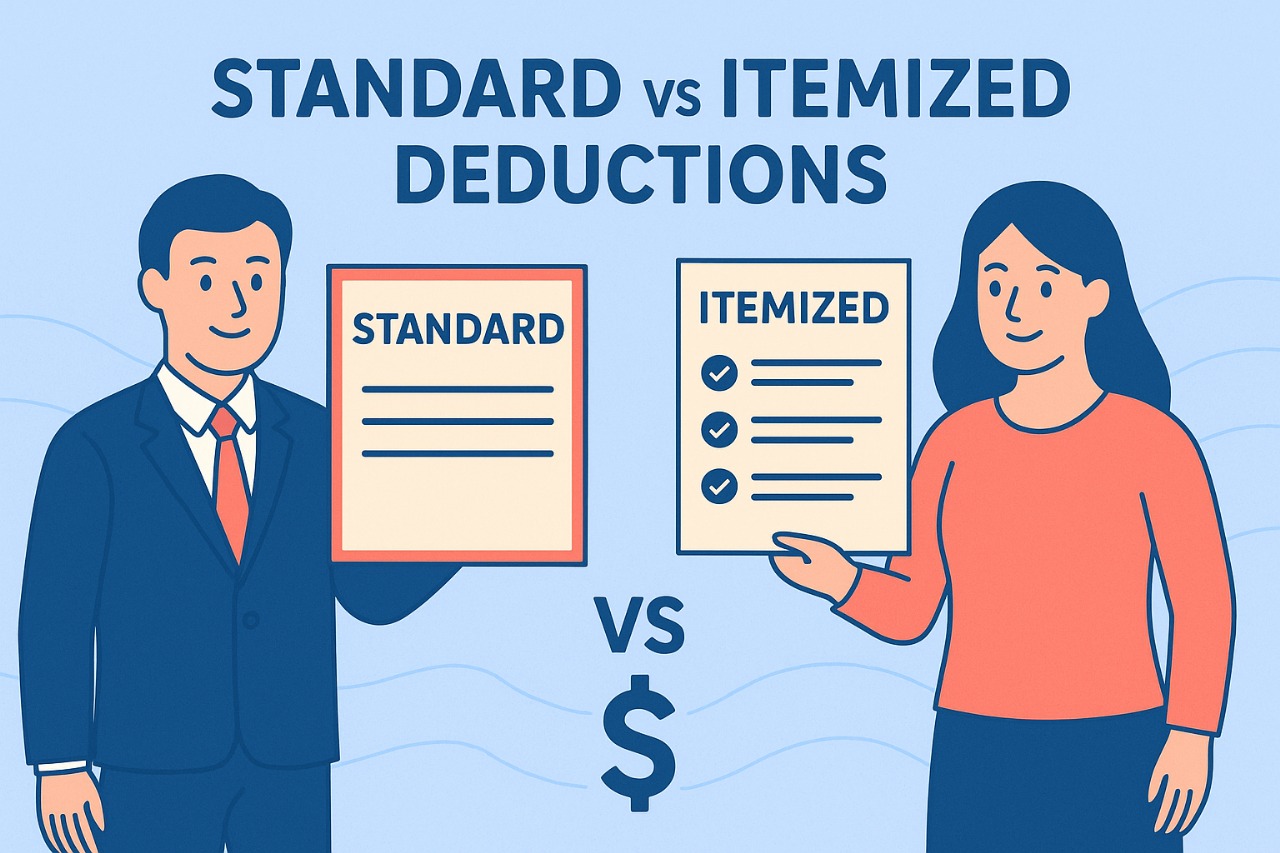 WhatsApp
WhatsApp
 Call Us
Call Us
 Email Us
Email Us
 Whatsapp Community
Whatsapp Community

Filing your U.S. income tax return can be confusing — especially for NRIs and U.S. residents with global income. One of the most important choices that directly affects your U.S. tax refund is deciding between the standard deduction and itemized deductions.
Understanding this distinction can help you maximize your tax savings, reduce your taxable income, and make the most of your U.S. tax filing.
At Dinesh Aarjav & Associates, we specialize in U.S. tax filing for NRIs, expatriates, and cross-border families. Our U.S. and India tax experts ensure that your deductions, credits, and disclosures are optimized for both compliance and maximum refund.
A tax deduction reduces the portion of your income that’s subject to tax. In the United States, you can either claim a standard deduction (a flat, no-document option) or itemize deductions (where you list qualifying expenses).
Choosing the right method can change your effective tax rate, and for NRIs or individuals with dual income sources, the impact can be even greater.
The standard deduction is a fixed amount that automatically reduces your taxable income. It varies depending on your filing status — Single, Married Filing Jointly, or Head of Household.
It’s simple, quick, and perfect for taxpayers without large deductible expenses.
For most individuals with straightforward finances, claiming the standard deduction is the easiest way to lower U.S. taxes.
If your qualifying expenses exceed the standard deduction amount, itemizing deductions may result in greater savings. Here, you report specific eligible expenses, such as:
This option is ideal for homeowners, high earners, and generous donors — or for NRIs who maintain property, mortgages, or charitable activities in the U.S.
You should itemize your deductions if your total qualifying expenses are higher than the standard deduction for your filing status.
You may benefit from itemizing if:
One of the largest deductions available, it allows homeowners to deduct interest paid on qualified home loans. This is often a key driver in choosing to itemize.
Taxpayers can deduct up to $10,000 per household ($5,000 if married filing separately) in combined state income, property, and sales taxes.
Donations to eligible charities or religious organizations can significantly reduce taxable income. For NRIs with philanthropic goals, this is a great way to combine impact with tax benefits.
Unreimbursed medical expenses exceeding 7.5% of Adjusted Gross Income (AGI) can be deducted.
Certain investment fees, gambling losses (up to winnings), and tax preparation costs may qualify as itemized deductions as well.
Charitable donations are not just good for society — they’re also one of the best ways to lower your U.S. tax bill.
If you donate stocks, ETFs, or cryptocurrency that have appreciated in value, you can:
Example: Donating $10,000 worth of stock purchased for $2,000 lets you claim a $10,000 deduction and skip capital gains on the $8,000 gain.
A Donor-Advised Fund allows you to contribute now, claim an immediate tax deduction, and decide later which charities to support.
This is especially useful for taxpayers in high-income years or those who wish to plan their giving over time.
Our U.S. tax experts at Dinesh Aarjav & Associates use data-driven comparison models to determine which approach yields maximum benefit for every client — particularly for NRIs filing U.S. taxes with additional Indian income or foreign tax credits.
Navigating U.S. tax laws, foreign income, and deductions can get complex, especially when you have financial ties in India. That’s where professional help makes a difference.
At Dinesh Aarjav & Associates, we provide:
Our U.S.-India tax team ensures that every deduction you claim is fully compliant and optimized for maximum savings.
The standard deduction is a flat amount that reduces taxable income without paperwork. Itemized deductions involve listing qualified expenses like mortgage interest or medical costs. Choose the higher one for better savings.
You can claim up to $10,000 in combined state and local income, property, or sales taxes per household per year.
Yes, donations to IRS-recognized charities can be deducted. Donating appreciated assets like stocks can double the tax benefit.
Maintain Form 1098, donation receipts, medical bills, and proof of state/local taxes paid for IRS verification.
Absolutely. NRIs can contribute to DAFs, take immediate deductions, and decide later which charities to support.
Deciding between standard and itemized deductions can greatly impact your U.S. tax refund. While the standard deduction offers simplicity, itemizing can unlock deeper tax savings for those with larger deductible expenses.
If you are an NRI, OCI, or expatriate managing income in both the U.S. and India, professional advice is essential.
At Dinesh Aarjav & Associates, we specialize in U.S. tax filing for NRIs, cross-border taxation, and deduction planning — ensuring compliance, accuracy, and maximum refund every time.






